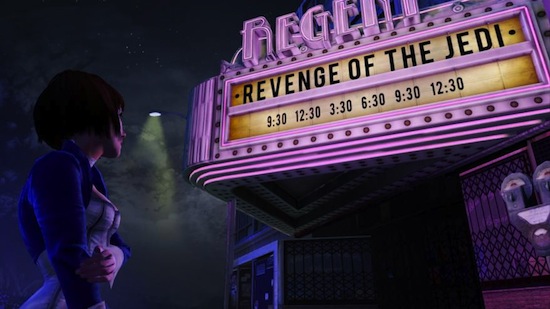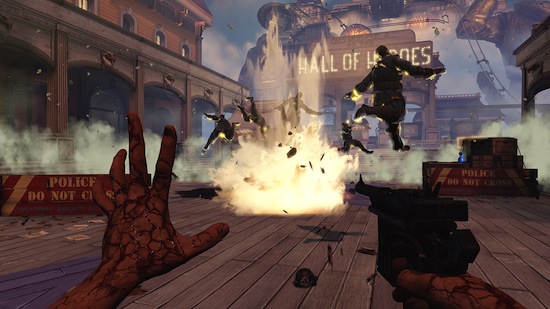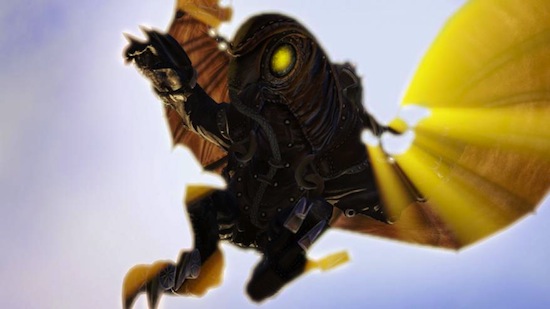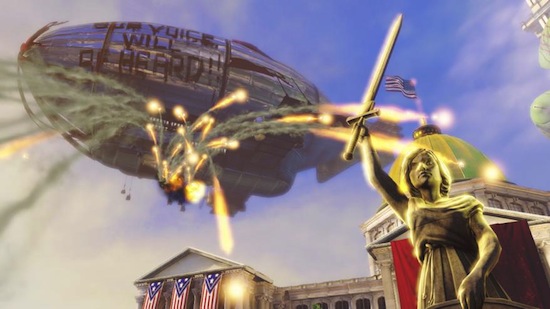Bioshock Infinite review, xbox360
Bioshock Infinite has redefined a few things in the last month, how to divide the internet into theological debating groups is one of them.
 The rain of plaudits continues and Infinite is celebrated as the game of the year, so far. Taking a moment to remember Bioshock, it was a game that lit the way for this generation. Delivering a solid experience in storytelling, RPG lite and a well built shooter to boot. The game delved the depths of undersea city Rapture, delivering boyhood dreams to anybody that grew up reading Jules Verne novels. Now after a disappointing sequel handled elsewhere, the original team are back on board to realise Infinite, switching the playing field to the heavens in the form of floating metropolis Columbia.
The rain of plaudits continues and Infinite is celebrated as the game of the year, so far. Taking a moment to remember Bioshock, it was a game that lit the way for this generation. Delivering a solid experience in storytelling, RPG lite and a well built shooter to boot. The game delved the depths of undersea city Rapture, delivering boyhood dreams to anybody that grew up reading Jules Verne novels. Now after a disappointing sequel handled elsewhere, the original team are back on board to realise Infinite, switching the playing field to the heavens in the form of floating metropolis Columbia.
Straight off, this game is beautiful even on consoles, on high spec PC it is a thing to be seen. Even on booting up, the menu system has a magical presence, the picturesque scene swinging around to posters and billboards that reveal the menu options beneath. It is quick, smooth, clever and reeks of the quality you are about to experience. Sometimes little things stand out for me and Bioshock Infinite is no exception, I get a tickle of happiness everytime I fire it up and select ‘continue game’ that shows me something is right with this world.
Mirroring the opening events of Bioshock the game starts off approaching a lighthouse, enter the lighthouse and start looting in true Bioshock fashion, by time you (a certain Mr Booker Dewitt) get up top there should be a few coins in your pockets. Then say goodbye to the earth and enjoy a rocket ride up to Columbia, reversely reminiscent of the bathysphere in Bioshock, but perhaps one of the least convincing aspects of this outing.
Once on Columbia the graphical design shows its strength, the palette is beautiful, the environment so well captured it deserves to be looked at, viewed quietly and enjoyed. The streets of Columbia seem far away from its native United States, more of a European utopia to me. The level of detail around you is obviously a labour of love and the population shows enough variety in models to help you ignore their NPC behaviours. Dressing and structure all build on the illusion of Columbia, even though the areas are fairly large, the game does a great job of making you think you have more freedom within a bigger play area than you really have. Well Bioshock was the same, in fact it was a damn sight more claustrophobic in places, so that’s progress.
 As the mission and handholding plays out aboard the floating city it does not take long for the cracks in Columbia to start showing, this utopia is not all it seems, hard decisions are soon to be made and violence swiftly follows. The narrative then kicks into gear and takes you on a journey, the game is very clever at making set pieces feel like natural events and apart from the occasional loss of control it never shatters the illusion that is woven for you. It does not take long for your mission objective Elizabeth to show up, after that the journey adds some emotional highs and lows, throwing some impressive curves along the way.
As the mission and handholding plays out aboard the floating city it does not take long for the cracks in Columbia to start showing, this utopia is not all it seems, hard decisions are soon to be made and violence swiftly follows. The narrative then kicks into gear and takes you on a journey, the game is very clever at making set pieces feel like natural events and apart from the occasional loss of control it never shatters the illusion that is woven for you. It does not take long for your mission objective Elizabeth to show up, after that the journey adds some emotional highs and lows, throwing some impressive curves along the way.
Taking a moment over Elizabeth, this is not some desperate A.I., she behaves so independently you just accept her being around. She adds depth with her commentary, the voice acting is superb and is always on hand to toss you spare ammunition or Salts to replenish your vigours. Elizabeth is fundamental to the story, she is smart and powerful and as such rarely gets into difficulty, she actually spends most of her time watching your back, learn to appreciate it. On top of the support roles, you can guide her ability to open tears in the fabric of the world, allowing access to parallel worlds, mostly this function will add an ammunition dump or a hook allowing access to a higher position. It can feel a little forced, although there are story related tears that make more sense. Her control of and relationship with the monstrous Songbird, is an interesting aspect, but the creatures use in the finale feels like the build up was perhaps contrived to be used in a short period as a power you could never find yourself in the desks and trashcans of Columbia.
Bioshock Infinite opens up a new set of powers from the magic box, this time vigours as opposed to the future setting of Bioshock where they are Plasmids. Either way they are a lot of fun to wield and Booker can turn encounters smartly by using their power and the environment to great effect. In Bioshock, I felt there was a strategy to using Plasmids and often a need to couple them with environmental effects, I had more respect for the denizens of Rapture than I do for the populace of Columbia who seem more susceptible to being hammered by repeated combinations. As far as ‘Heavy’ enemies go the Patriots and Handymen tend to be predictable bullet sponges, the latter having a habit of being dropped in without warning. All well and good, but the beauty of dealing with a Big Daddy was the preparation, the strategy, turning enemy on enemy – they were a damn sight more scary than annoying, plus I always felt a little sad whenever I defeated one.
During development the Skyhooks and their floating roller coasters that provide inter island access where major highlights, as were some other apparently story driven events that never finally transpired. The Skyhook itself functions as a melee weapon as well as the magnetic slide and ride tool, however because of the use of areas, the rails are limited to the area you are in and very rarely offer much more than a circuit around the current map. A nice addition, adding a dimension and the ability to move more vertically, but do they really offer what they said on the tin?
The story wraps up in quite a breathtaking way, even when spoilt it had quite an effect on me, as for the content, well there is a heady mix of theology and theory that will have debates raging for some time. Something I have found interesting is the significance of Bioshock’s Lighthouse opening and connections. I have discovered in the works of H.G. Wells, an author fond of utopian societies, time travel, paradoxes and parallel worlds very similar imagery, I admit to not reading his work ‘God the Invisible King’ but the covers of the book raise a wry smile. However the developers came to their narrative conclusions, I like to think that any influence by Mr Wells would be fitting for such a steampunk experience.
While Infinite is not perfect, it is close to perfect. On the whole, the game is a fantastic step forward in narrative, production and quality, the likes of which we may never see again in this generation of consoles.
Every home should have a copy, because this is the time gaming starts to feel ‘grown up’.







